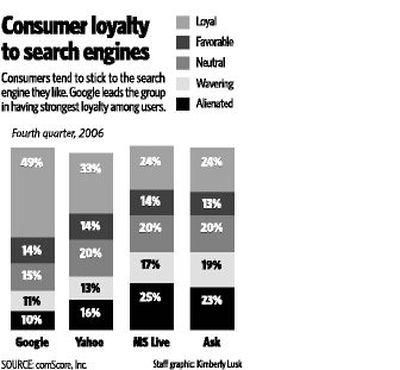Search isn’t over

Google currently sits on the top rung of the multibillion-dollar Web search-engine market. But people forget Google only grabbed the top spot in the past five years. It shouldn’t get too complacent. Inspired by Google’s own example of capturing search-engine dominance by building a better product, companies both young and well-established have begun working hard on dethroning the current champ. Those upstarts say they’re developing search technology that will give users more choices, faster results and more natural search terms.
Among the bright and promising startups in the game are two West Coast firms: Digger.com and the not-yet-unleashed Powerset.com.
But one of the richest and most focused Google competitors is Redmond-based Microsoft Corp. For a company that has made huge fortunes developing desktop and business software, Microsoft is spending billions of dollars on a risky gamble to unseat the six-colored Google logo and replace it with its own Live Search brand.
Microsoft currently ranks third in overall U.S. market share. Google has about 48 percent, Yahoo 28 percent, and Live Search nearly 11 percent.
Beyond having enormous resources to spend on battling Google and Yahoo, Microsoft has a valuable roster of popular Web services and sites that can direct search traffic to the Live Search site. Those include Hotmail, MSN and the instant messaging community of Live Messenger, said Justin Osmer, senior project manager for Microsoft’s Live Search group.
“We know it’s an uphill battle, but we’re in it for the long haul,” said Osmer. Since September when Live Search debuted, Microsoft’s share of the market has barely improved. Even so, Osmer said Microsoft will win customers one at a time, by finding ways to get better search results.
“It’s in Microsoft’s DNA to tackle hard software problems. And we believe we have the right people, with the right brains, and the right technology to turn out the type of product people want,” said Osmer.
Osmer ticked off key improvements offered in Live Search:
“Instant answers. Not solely a Microsoft innovation, Live Search now finds quick responses to basic questions. “What’s Spokane’s weather?” produces an instant report as the first result. “Who’s Spokane’s mayor?” produces a Dennis Hession link at Wikipedia.
“Related searches. Search for Harrison Ford and you get the usual first page of relevant results. On the right side are related Harrison Ford groups of answers: Harrison Ford movies, Harrison Ford Forum, and others.
■ Improved image search. Instead of several pages of results, Live finds and shows all image results in a scrolling sequence of thumbnails. The results can all be instantly resized either larger or smaller through a slider bar at the top of the page. Near the slider is another image feature called Scratchpad, Osmer said.
“ScratchPad allows you to store any number of the images you’ve found and review them later,” said Osmer.
Others tracking the search engine industry agree it’s too early to write off Microsoft or to assume that Google has won the battle.
“It’s a long race, a marathon,” said Oren Etzioni, a University of Washington computer science professor, and one of the founders of the popular travel site Farecast.com. “We’re only in the second or third mile, so it’s still possible for new companies to come out ahead.”
Etzioni said the next great search engine developer might be a version of what Google was once – adventurous, cool and focused on consumers.
In 1993 when the Web first hit public awareness, the big innovation was the browser. At that point, no one foresaw the browser becoming second fiddle to the Web search engine as the key element of personal computing.
Google was a big part of that shift, said University of Washington Information School professor Mike Eisenberg. “Google made their search function simple and attractive. But they also showed results that were clearly better than their predecessors,” Eisenberg said.
Etzioni said the rampaging surge of online information only makes the hunt for the next great search engine more intense.
“We’re dealing with information overload,” he said. “That means one thing, search is here to stay.”